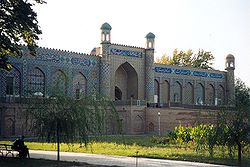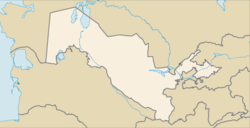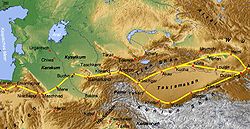- Kokand
-
Kokand usb.: Qoʻqon (Қўқон) Der Khanspalast in Kokand
Basisdaten Staat:  Usbekistan
UsbekistanProvinz: Fargʻona Koordinaten: 40° 32′ N, 70° 57′ O40.52861111111170.9425409Koordinaten: 40° 31′ 43″ N, 70° 56′ 33″ O Höhe: 409 m Einwohner: 187.226 (2006) Qoʻqon (usbekisch Qoʻqon; deutsch Kokand; russisch Коканд) ist eine Stadt in Usbekistan mit 187.000 Einwohnern (Stand 1. Januar 2006).
Geschichte
Die Stadt hatte früher eine Schlüsselposition am Eingang zum Ferghanatal. Sie liegt an der wichtigen Seidenstraße, einer Karawanenstraße, die das Mittelmeer mit Ost- und Südasien verbindet. Im 13. Jahrhundert zerstörten mongolische Truppen die Stadt.
Die moderne Stadt entwickelte sich aus einem 1732 errichteten Fort. 1740 wurde der Ort Hauptstadt des Khanats von Kokand. Seine größte Ausdehnung besaß das Khanat in der ersten Hälfte des 19. Jahrhunderts, als es Teile des heutigen Kasachstan umfasste. Zu dieser Zeit war Kokand ein bedeutendes Handelszentrum mit mehr als 300 Moscheen.
1876 eroberten russische Streitkräfte die Stadt. Kokand wurde Teil des russischen Generalgouvernement Turkestan und war zwischen 1917 und 1918 Sitz der anti-bolschewistischen provisorischen Regierung des autonomen Turkestan.
Kultur und Sehenswürdigkeiten
Sehenswert ist unter anderem der zwischen 1863 und 1873 erbaute Palast von Xudayar Khan. Die Fassade des Palastes schmücken zahlreiche Farben und Ornamente. Das Dekor ist ein Zeugnis der traditionellen Volkskunst dieser Region, der Keramikbrennerei. Gebrauchsgegenstände und Baukeramik wurden nach überlieferter Tradition hergestellt. Die bunten Fliesen sind ein bedeutendes Element der islamischem Baukunst. Im Palast befindet sich auch ein Museum für Landeskunde.
Erwähnenswert sind auch die von 1809 bis 1812 errichtete Dschuma-Moschee, die Madrasa Amin Beg von 1830, die Nekropole Dachma-i-Schochon, das Modari-Mausoleum und das Hamza-Museum.
Wirtschaft und Infrastruktur
Die Stadt ist ein Industriezentrum in dem Dünger, Chemikalien, Maschinen, Textilien und Nahrungsmittel hergestellt werden. Mit dem Flughafen, dem Hauptbahnhof und dem Fernbusbahnhof hat sie Verbindung mit anderen Landesteilen. Kokand ist auch Bildungszentrum mit Instituten, Hochschulen und Gymnasien.
Wikimedia Foundation.



